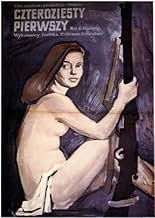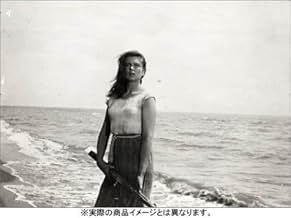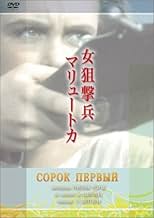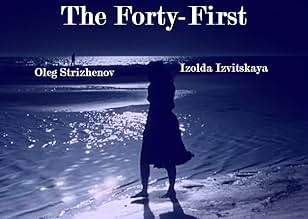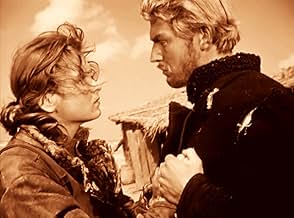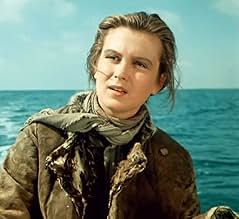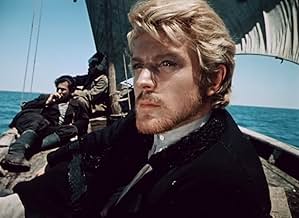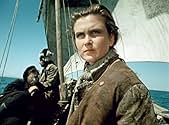AVALIAÇÃO DA IMDb
7,5/10
1,8 mil
SUA AVALIAÇÃO
Segue um romance inesperado entre uma atiradora do Exército Vermelho e um oficial do Exército Branco.Segue um romance inesperado entre uma atiradora do Exército Vermelho e um oficial do Exército Branco.Segue um romance inesperado entre uma atiradora do Exército Vermelho e um oficial do Exército Branco.
- Direção
- Roteiristas
- Artistas
- Prêmios
- 1 vitória e 1 indicação no total
Nikolai Dupak
- Soldier Andrei Chupilko
- (as N. Dupak)
Georgi Shapovalov
- Soldier Terentyev
- (as G. Shapovalov)
Lev Kovylin
- Soldier Kovylin
- (as L. Kovylin)
Yuriy Romanov
- Soldier Vyakhir
- (as Yu. Romanov)
Daniil Netrebin
- Soldier Semyannin
- (as D. Netrebin)
Asanbek Umuraliyev
- Soldier Umankul
- (as A. Umuraliev)
Anatoli Kokorin
- Soldier Yegorov
- (as A. Kokorin)
Vadim Sinitsyn
- Wounded soldier
- (as V. Sinitsyn)
Kirey Zharkimbayev
- Timerkul
- (as K. Zharkimbayev)
- Direção
- Roteiristas
- Elenco e equipe completos
- Produção, bilheteria e muito mais no IMDbPro
Avaliações em destaque
An outstanding piece of work, great color and lighting, straight forward story without the usual Hollywood junket attached proving again the skill of Soviet cinema making; very good ending.
Watching this I was reminded of Hollywood Westerns of the mid-1950s, with the saturated color and framing of faces for psychological effect. The constant orchestral score was sometimes unnecessary and somewhat annoying; but as an interview with the director points out, the idea wasn't a grim war story, or even a political screed, but a love story, where sweeping music isn't out of place; and this is a love story.
The scenes with the nomads are striking and unforgettable; the desert sequences are also memorable, as is most of the film.
Much of the acting could be considered somewhat overwrought, with people flinging themselves down on the ground and making exaggerated gestures, so much so it almost seemed a modernized film with silent movie performances.
For those unfamiliar with the original novella, it may not matter, but the movie stays quite close to the story.
Honestly, this movie does seem dated, but is well worth the time for several scenes of honest beauty and some decent-enough acting performances. And, I have to admit, while I watched the majority of the film with more or less dispassionate interest, I was unprepared for the rifle shot at the end. It's much, MUCH more shocking than I expected, and if only for that reason, this movie sticks in my head.
The scenes with the nomads are striking and unforgettable; the desert sequences are also memorable, as is most of the film.
Much of the acting could be considered somewhat overwrought, with people flinging themselves down on the ground and making exaggerated gestures, so much so it almost seemed a modernized film with silent movie performances.
For those unfamiliar with the original novella, it may not matter, but the movie stays quite close to the story.
Honestly, this movie does seem dated, but is well worth the time for several scenes of honest beauty and some decent-enough acting performances. And, I have to admit, while I watched the majority of the film with more or less dispassionate interest, I was unprepared for the rifle shot at the end. It's much, MUCH more shocking than I expected, and if only for that reason, this movie sticks in my head.
Grigori Chukhrai's film, The Forty First, sets itself up to be understood as a mythic series of events; the opening scene's churning waves seem to take the viewer away to a different world and the narration sets the story in the post-Revolutionary Civil War. This narration gives the effect of a story being told, and the way the landscape is portrayed creates an unreal landscape. The colors always seem too saturated and the sky hangs close and heavy over the actors, giving the appearance of a fish bowl. Maryutka's inclusion in the plot attests to the Bolshevik ideal of gender equality, making a break with Stalinism's reinstatement of traditional gender roles; her being referred to as an "Amazon" enhances the mythic quality of the film. Chukhrai consciously constructs shots that juxtapose; the scene of Maryutka and the White Army lieutenant walking separate on the beach contrasts the two in space as they both walk in different points of the frame in different directions. The final scenes are obviously ideological: the dialogue is crafted as a metaphor for Tsarist Russia and Communist Russia, with the lieutenant (Tsarism) pleading Maryutka (Communism) to return to how they were before the fighting; the officer's dangling cross necklace is an ever-present symbol of Imperial Russia, designating that even when all visual indicators of partisanship are gone (as he and Maryutka's uniforms have been destroyed by the elements), there is still an irreconcilable difference present. The last scene illustrates the valuation of duty over emotions. Besides the smartly handled ideology, the visual effects are The Forty First's strengths. The color palette and the contrasts it creates are striking, and create a hazy, dreamlike world in which a legend is played out.
Quite a filmmaker this Chukhrai was. Not much available from him, but I am happy to have seen two of his movies. "The Forty-first" perhaps wasn't as great as the wonderful "Ballad of a Soldier", but this is still quite an interesting film. Both of these films are war films, but contrary to what one might expect these films are told in a rather romantic, light-hearted, Hollywood style. Both films do have tragic elements which present themselves as the films progress, but they are largely rather light and enjoyable, even charming romance pictures of loved ones being torn apart and doomed by war. This story was started here with "The Forty-first" and would be perfected in "Ballad of a Soldier".
The script isn't particularly strong here, but where this film really stands out is in its visuals. An utterly stunning visual work from Chukhrai. I'm not sure I have seen a color film look like this one before! You have to see it to understand. Additionally, it's just constantly a visually dynamic film in Chukhrai's camera-movement and use of close-ups. The film is at the very least continually visually interesting and at its peak just stunning to look at. There's a really rich, dreamy atmosphere that develops by the end of the movie, and it makes for a quite unique viewing experience.
The ending is both quite outlandish but also tragic. Not too sure what to completely make of it. Then again, this was never a film which really strived for any kind of realism, so its over the top nature isn't too jarring with the rest. Actually, the more I think about it, the more I like it.
The script isn't particularly strong here, but where this film really stands out is in its visuals. An utterly stunning visual work from Chukhrai. I'm not sure I have seen a color film look like this one before! You have to see it to understand. Additionally, it's just constantly a visually dynamic film in Chukhrai's camera-movement and use of close-ups. The film is at the very least continually visually interesting and at its peak just stunning to look at. There's a really rich, dreamy atmosphere that develops by the end of the movie, and it makes for a quite unique viewing experience.
The ending is both quite outlandish but also tragic. Not too sure what to completely make of it. Then again, this was never a film which really strived for any kind of realism, so its over the top nature isn't too jarring with the rest. Actually, the more I think about it, the more I like it.
wise use of close-up.wonderful images. pure poetry. a special vision about war and love. all of that makes it more than propaganda tool but an impressive expression of profound art. it is a film about values and beauty, choices and ideals. realistic, cruel, full of subtle symbols - the desert, the isle -, mark of a great director and science of nuances from two impressive actors. the story is only basic point for respect the ideological commands. but the skin of this nucleus has the rare virtue to make it more than piece of a period. the final dialog between lovers , the end, the boat in storm and near the isle, each is a precious ingredient for an universal message about duty and choices, far to basic triumphal message of regime.
Você sabia?
- ConexõesFeatured in Fejezetek a film történetéböl: A szovjet film 1953-1970 (1990)
Principais escolhas
Faça login para avaliar e ver a lista de recomendações personalizadas
- How long is The Forty-First?Fornecido pela Alexa
Detalhes
Contribua para esta página
Sugerir uma alteração ou adicionar conteúdo ausente

